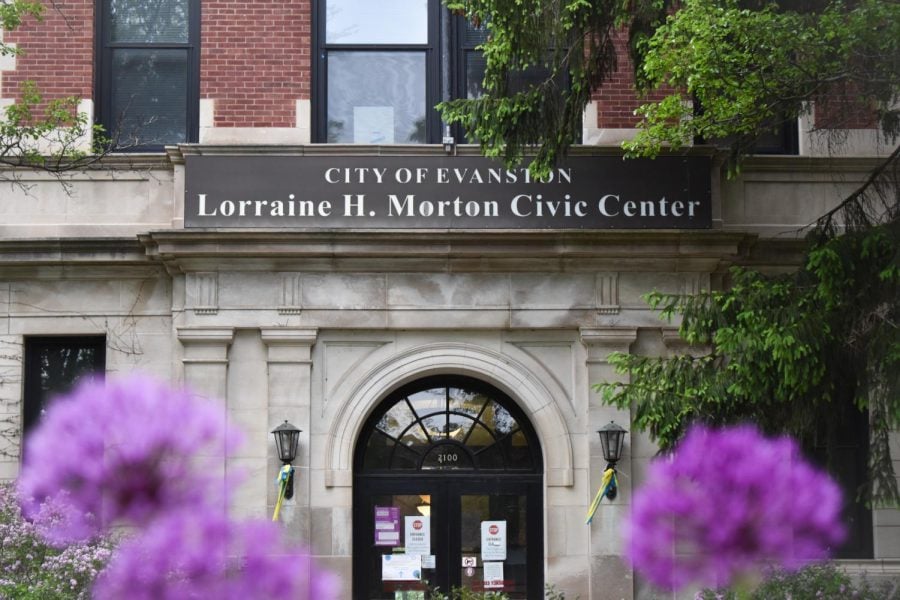City Council discusses proposed 2023 budget, pension debt
Daily file photo by Jacob Wendler
The Lorraine H. Morton Civic Center. City Council discussed how to allocate remaining ARPA funds Monday.
October 18, 2022
City Council discussed Evanston’s proposed 2023 budget Monday, touching on major issues like the city’s significant pension debt, Northwestern’s proposal to rebuild Ryan Field and the property tax increase.
The proposed budget is slated to be $402.5 million, a $42.1 million increase from the adopted 2022 budget. Funds prioritize investments in city facilities, sustainability efforts and job creation. The budget includes a 4% increase in the net property tax levy, which will help increase the city’s main operating fund by $7.4 million.
However, some city officials, including Mayor Daniel Biss, do not support the proposed budget.
Biss said the budget is inefficient in its property tax increase and usage of the American Rescue Plan Act funds to achieve balances in certain categories.
“I think a situation where all that is necessary has gotta come with real serious evidence that we’re doing everything we can to find possible saving and efficiency,” Biss said. “I don’t think that has been consistent with the expansion of staff that’s been proposed.”
Pension debt
The city’s pension debt dominated Monday’s meeting. The property tax levy for the city’s fire pension fund increased by 3.8% in the new budget, while the levy for the police pension fund decreased by 4.4%.
This reflects a change in the amount of Evanston’s general fund that will be used to fill the pension debt.
“Funds are needed for the pension debt payments and we really need to bring the pension debt payments and our debt in general under control,” Evanston resident Mike Vasilko said.
Ald. Clare Kelly (1st) said she believes the city can keep the property tax levy flat while still fully funding the pension debt.
David Livingston, the chair of the city’s Finance & Budget Committee, said Evanston should find a path to funding 100% of the pension fund by 2040.
“I don’t know why we would want to leave the Evanston of 2040 with over $100 million of remaining pension debt,” Livingston said.
Ryan Field
Councilmembers and city staff also expressed concern about how NU’s plan to rebuild Ryan Field will affect city revenues. Evanston makes money from parking fees on gamedays, as well as indirect revenue from sales tax for food sold at the stadium.
Chief Financial Officer and City Treasurer Hitesh Desai estimated a loss of about $950,000 dollars in revenue per season while the field is under construction. If approved, construction of the new stadium will begin after the 2023 football season and be completed in time for the 2026 season.
“There will be some loss of revenues while construction goes on,” he said. “We generate a lot of money during football season.”
Mayor Daniel Biss cautioned against focusing on these revenues, saying that there are “a lot of question marks right now” about the future of the stadium.
Property tax increase
A 4% property tax increase was a point of controversy among councilmembers and public commenters. Residents expressed concern that the tax increase will add to a general increase in the cost of living in Evanston.
“If a high priority goal is that we want Evanston to be a place where people get to live rather than have to be faced with leaving then, let’s work to achieve that goal,” Evanston resident Trisha Connolly said.
Lifelong resident Brian Becharas said he’s worried the property tax increase is funding unnecessary civic projects, like a $6.3 million project to build a new animal shelter.
Construction has been in the works for almost four years. Evanston’s Animal Welfare Committee said the shelter is outdated, is not ADA compliant and poses great risk to the animals and humans inside.
“I feel it’s becoming harder and harder for people… to remain because of the escalating costs of lots of things,” Becharas said.
Email: [email protected]
Twitter: @saullpink
Related Stories:
— City Council approves $50,000 for Refugee Resettlement Fund
— City Council hears parking study suggesting raising parking rate
— City Council hears updates on Trilogy’s crisis emergency response program and Living Room












